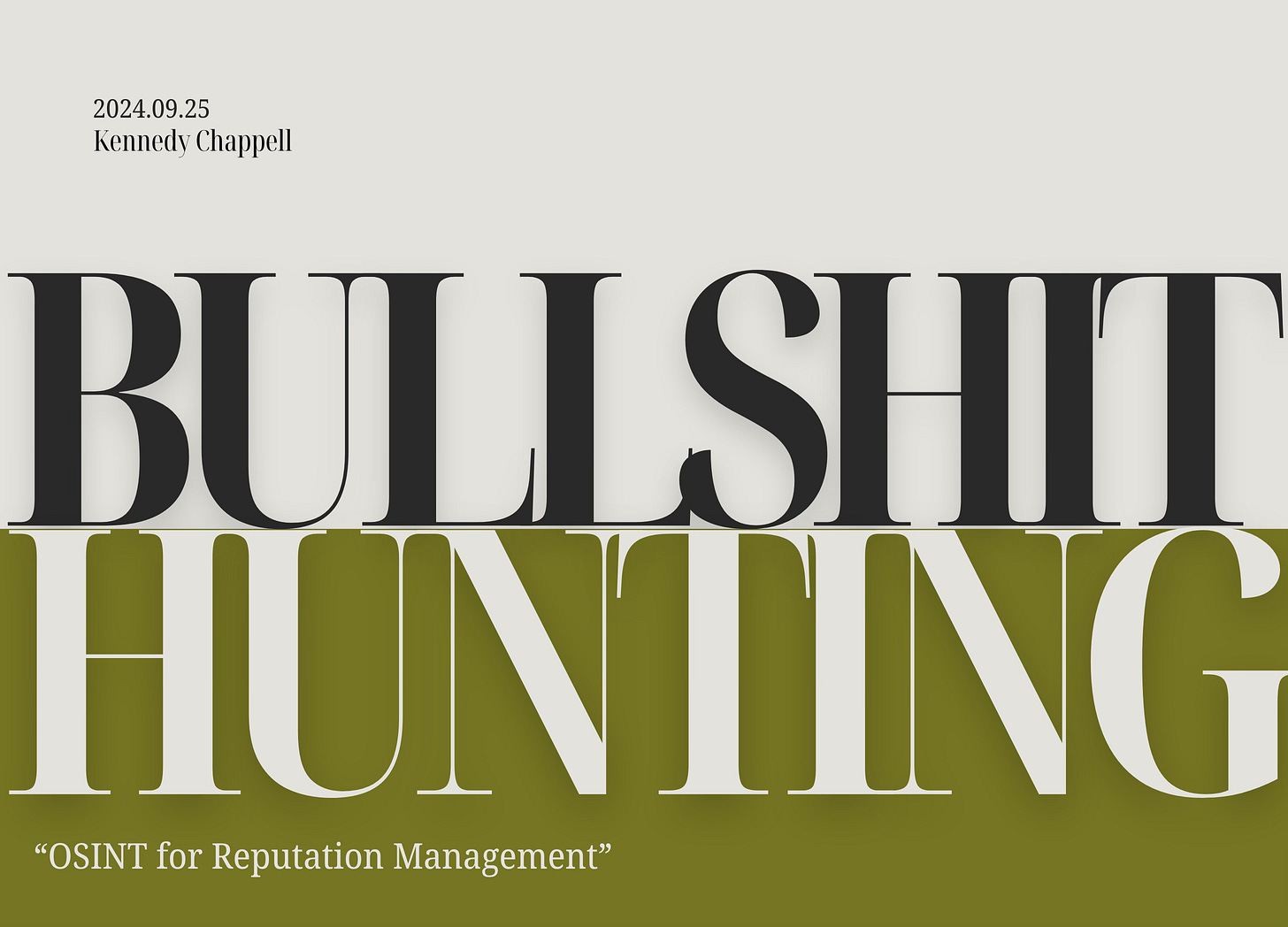OSINT for Reputation Management
Don't delete bad reviews, and only die on the best of hills
If you’re looking for a crash course in the human condition, might I suggest working in corporate communications during a time of intense political unrest?
Luckily, my foundational crash course came during an otherwise quiet season, when a client had a PR crisis so astronomical, so egregious, and so utterly avoidable that the only thing left to do was look him in the eye and ask, “Hey, real quick question—why?”
In that moment, I learned that ego is a hell of a drug, and once someone starts their trek up the hill of wrong, there's only so much you can do to pull them down before they simply die there.
From then on, I lost what little filter I had left with clients. "No" and "I really can't advise that" became my most overused sentiments as we navigated the turbulent times of 2020 and onward.
Because here's the thing: Your business is your baby—you nurture it, love it, and believe in it because you have to. But when you send it out into the world, and it inevitably screws up, your love will have little impact on the people who don’t have to.
No amount of personal justification, defence, or grovelling will save you if someone is hurt, upset, or disappointed as a result of your "baby."
Your business, as its own entity, is open to all sorts of perceptions and critiques by the people who interact with it, and frankly, your core intentions don't matter once something goes wrong. We all start our businesses and build our products and services because we believe in them. But when you rely on buy-in from consumers, your success is defined by their support.
It is imperative to the health of your business to understand how people perceive you, why, and how it's affecting the way they choose to interact with you or not.
The act of monitoring outside perception of your "brand," which we'll call it for ease, is Reputation Management, and there are entire roles and industries dedicated to doing it properly.
And, surprise, surprise, you'll find most of it is fairly simple OSINT work!
What Can You Monitor?
Social Media: Platforms like Twitter, Instagram, and TikTok provide a wealth of information. Monitoring hashtags, mentions, and comments can help businesses understand how their brand is being perceived. Open-source tools like TweetDeck or social listening platforms can help filter conversations and track sentiment over time.
Review Sites: Whether on Google Reviews, Yelp, or industry-specific sites, customer feedback plays a crucial role in shaping reputation. Data scraping tools can harvest reviews and help identify trends in customer satisfaction or complaints.
Blogs and Articles: Track mentions of your brand across blogs and news outlets to detect any emerging narratives. Google Alerts can notify you when your brand appears in new content, so you can assess the impact and react if needed.
Forums and Communities: Often, critical conversations about brands happen on platforms like Reddit, specialized forums, local Facebook groups or even Discord channels. Monitoring these spaces can help businesses uncover grassroots feedback.
Identifying and Managing PR Risks: Simply put, you want early detection of negative sentiment. Using OSINT to identify red flags—spikes in negative mentions or complaints—can give you or your communications team time to develop a response strategy. Real-time data enables swift action, whether that’s issuing a public statement, clarifying misunderstandings, or adjusting your messaging.
Best Tools and Practices: While enterprise solutions like Meltwater or Brandwatch provide solid insights, there are also free or low-cost tools and practices. Personally, I wasn’t going to hand the cost of these tools down to clients or absorb it myself when I could smash my little fingers into my keyboard every day, monitor available information, and note and timeline it to predict trends. It never failed me. Like anything, the key is consistency—regular monitoring ensures that no conversation slips through the cracks.
You will always need the human element. The data you receive from OSINT or PR tools still needs to be interpreted. Analyzing and crafting thoughtful responses that reflect your desire to “get it right” is irreplaceable.
As a final aside, if I could offer one piece of unsolicited advice, do not delete negative reviews or employ unethical practices to garner good reviews (I'm looking at you, every company that offers bonus incentives for reviews).
Studies have indicated time and time again that consumers are skeptical of only positive reviews. This phenomenon—the "review paradox"—raises concerns about authenticity and can suggest that reviews are being filtered. Potential customers look for a reasonable mix of yay and nay to gauge credibility.
There is integrity in responding to negative feedback. Own your mistakes, harness humility when an experience isn't ideal, and remember that you're just a person, and so is your client and a lot can be solved with simple acknowledgement. And if a review is unfair, you're allowed to say that, and trust that your customer base can employ critical thinking skills when Barb takes to Google reviews to make her user error everyone else's problem.


